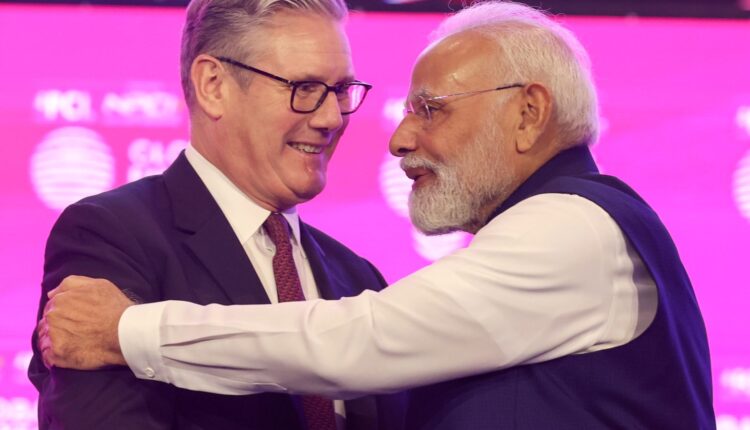Prime Minister Narendra Modi on Saturday met British Prime Minister Keir Starmer on the sidelines of the G20 Summit in Johannesburg, South Africa, noting that this year has infused “new energy” into the India–UK partnership.
“It was wonderful meeting Prime Minister Keir Starmer in Johannesburg. This year has brought new energy to the India–UK partnership and we will keep driving it forward across many domains,” PM Modi posted on X after their discussion.
Last month, Starmer, accompanied by the largest-ever UK trade delegation, undertook a two-day visit to India at PM Modi’s invitation. It was his first official visit to the country since assuming office, during which the two leaders held wide-ranging talks in Mumbai focused on expanding bilateral relations.
Starmer’s visit followed PM Modi’s trip to the UK in July. During that visit, Modi met Starmer at the British Prime Minister’s country residence at Chequers in Buckinghamshire, where the two leaders held a one-on-one meeting along with delegation-level talks.
Both leaders had welcomed the signing of the historic India–UK Comprehensive Economic and Trade Agreement (CETA), which elevated the Comprehensive Strategic Partnership to a new level while significantly boosting trade, investment, economic collaboration, and job creation in both countries.
Continuing engagements, Foreign Secretary Vikram Misri travelled to London earlier this month on his first bilateral visit as both nations worked to further advance cooperation across key sectors.
On October 31, External Affairs Minister S. Jaishankar highlighted that India–UK relations have transformed from a “complicated historical association” to a “dynamic and forward-looking partnership”, describing the past year as “exceptional” for the modern relationship.
Speaking at an event hosted by the British High Commission in New Delhi on King Charles’ birthday, Jaishankar recalled the recent high-level visits on both sides, including PM Modi’s trip to the UK during which the historic CETA was signed.
“During that visit, we also adopted Vision 2035 to guide our partnership across five pillars — Growth, Technology and Innovation, Defence and Security, Climate and Clean Energy, and Education. We also adopted a Defence Industrial Roadmap for the first time,” he said.



